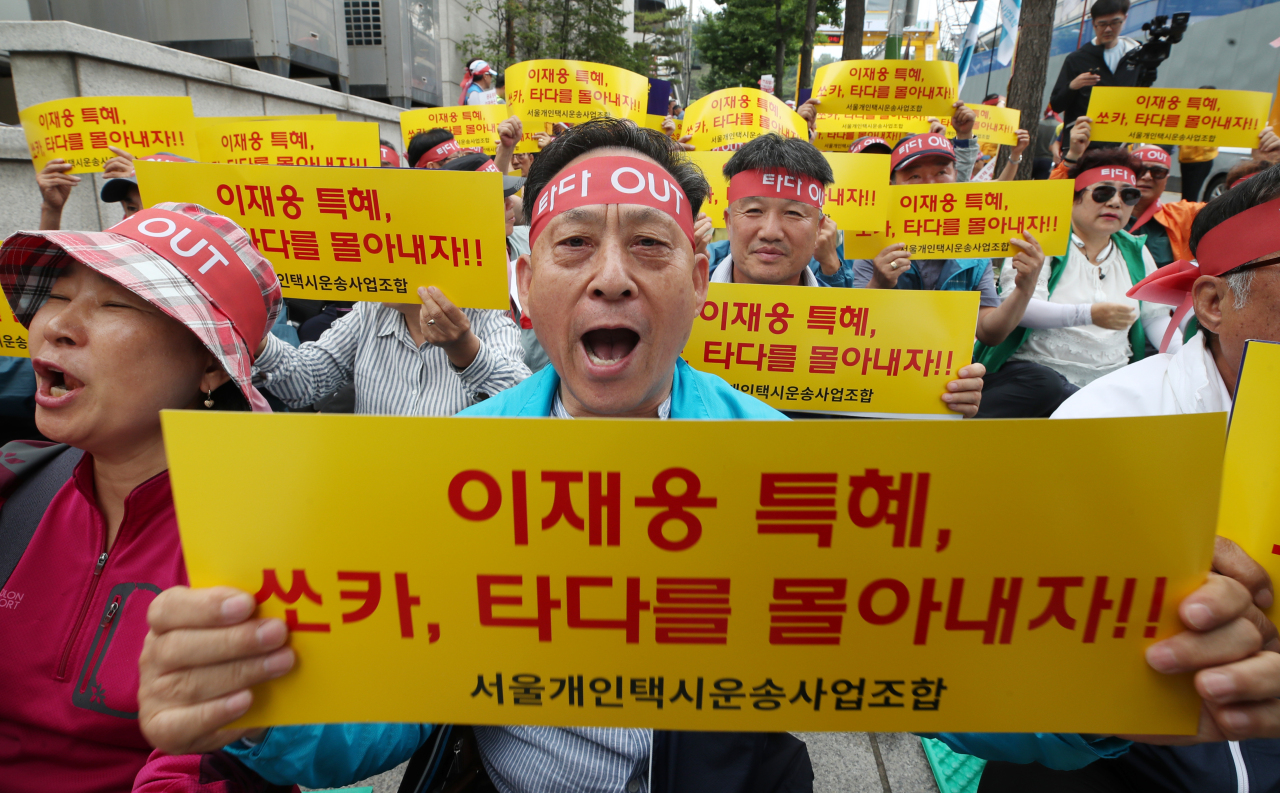South Korea’s major mobility startups raised their voice against the government’s latest plan to overhaul the controversial ride-sharing business here, saying Wednesday that the envisioned rules favor taxi drivers and bigger firms.
In a statement released after the Transport Ministry announced its reform plan for the country’s mobility industry, VCNC, which runs the popular ride-hailing service Tada, said the government’s plan would only build higher barriers and prevent startups from entering the business.
“We believe the reform plan appears to center on existing systems and those with vested interests,” said VCNC chief Park Jae-wook. “It is necessary to take a new approach and a new agreement to bring more benefits to the people.”
The government has been reluctant to approve Tada and similar ride-sharing services after massive protests from taxi drivers, who have blasted mobility startups and accused them of stealing their jobs.

Taxi drivers protesting Tada`s ride-hailing service. Yonhap
Earlier in the day, the Ministry of Land, Infrastructure and Transport said some ride-sharing services would be allowed to operate under the new plan, but for the time being those based on rental cars would not.
Companies that gain permission to operate the ride-sharing services, the ministry said, would have to contribute a certain portion of their earnings to a state-managed fund that would be established for the purchase of taxi licenses, of which it said there was an oversupply.
Noting that Korea has about 252,000 licensed taxis, with some 40,000 of those being out of service, the government said it would work to sort them out and encourage younger drivers to gain licenses, while also introducing a monthly salary system.
In what some argued was preferential treatment for bigger companies, the government also said it would ease regulations on ride-hailing services offered by the Kakao T platform, which connects taxis and customers. The Kakao T platform is operated by Kakao Mobility, an affiliate of mobile messenger app operator Kakao.
Tada, which hires part-time workers to drive rental cars with more than 11 seats, has been well received among riders who have grown disenchanted with conventional taxi services -- often criticized for reckless driving and selective choosing of customers based on their destination. Similar mobility service platforms have emerged as a result.
Taxi drivers, meanwhile, have called Tada’s services illegal, citing laws that prohibit drivers without taxi licenses from offering rides for pay.
Kim Sang-do, who deals with transportation policy at the Transport Ministry, pointed to “the huge gap in views of the taxi industry and mobility platform services” as the reason for the decision to disallow the use of rental cars for paid ride-hailing services.
Kim stressed that the ministry’s reform plan does not render Tada’s services illegal immediately, as certain procedures are necessary before the plan can be enacted into law. The government is expected to submit the plan to the National Assembly this September.
(jasonyeo@heraldcorp.com)






![[Graphic News] More Koreans say they plan long-distance trips this year](http://res.heraldm.com/phpwas/restmb_idxmake.php?idx=645&simg=/content/image/2024/04/17/20240417050828_0.gif&u=)